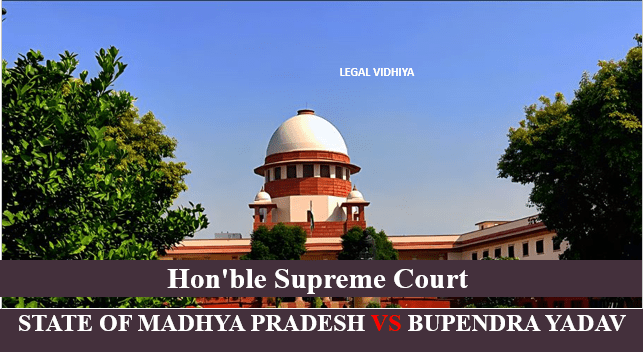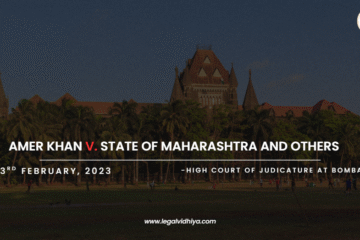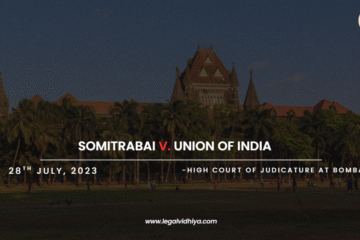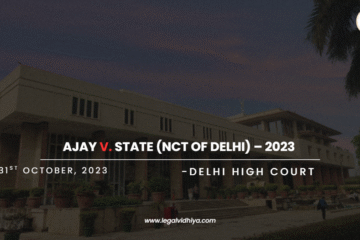
| CITATION | JT 2023 (9) SC 303 |
| DATE OF JUDGEMENT | 20-09-2023 |
| COURT | SUPREME COURT OF INDIA |
| APPELLANT | STATE OF MADHYA PRADESH |
| RESPONDENT | BHUPENDRA YADAV |
| BENCH | HIMA KOHLI, RAJESH BINDAL JJ. |
INTRODUCTION:
In a notable recent Supreme Court judgment , State of MP v. Bhupendra Yadav, delivered by Justices Hima Kohli and Rajesh Bindal, it was held that the acquittal judgement does not allow the candidate to be nominated, especially in cases where the acquittal is given on technical grounds like “benefit of the doubt” and in a heinous case.
The Supreme Court has emphasized that an employer has the right to assess a candidate’s suitability based on the position for which the candidate is being considered; the higher the position, the more stringent the standards should be used, and truthful disclosure by the candidate cannot circumvent the standard. It is the employer’s right to investigate and verify the candidate’s suitability. In the event of a concluded criminal case, whether heinous or not, the nature of the offence committed and the acquittal, whether honorable or favorable on a technicality, must be considered when making any decisions. Subsequently, if the employer concludes that the candidate is not suitable, it has the right not to appoint or terminate the candidate’s employment. It further held that an acquittal in a heinous criminal case cannot automatically qualify a candidate for a position in law enforcement post, more particularly in cases where the verdict for the acquittal was the result of the “benefit of the doubt” given to the candidate.
The court held that the dismissal by the state government was not mala fide or arbitrary, and therefore the dismissal of the candidate was upheld.
FACTS OF THE CASE:
The candidate was accused in a POSCO case where he was acquitted by the honorable court with “benefit of doubt”. He was accused of wrongfully restraining a minor and an attempt to outrage her modesty. A criminal case was filed in May 2015 against the candidate, in a Special Sessions case before the Additional Sessions Judge of the court. Charges have been booked under IPC and POCSO Act. The trial court then noted that a compromise was reached between the complainant and the candidate, after which the complainant and her friends who were witnesses in the case became hostile. Further, it was also noted that the charges against him under Section 341 of the IPC were compounded on the plea of compromise application by the parties. The Court attempted to continue the case as the remaining charges were non-compoundable, but as the complaint and witnesses in the case turned hostile, the Court acquitted the candidate.
In 2016, the following year, the state government conducted an entrance exam to fill vacancies in the police force. The candidate appeared for the exam and qualified in the OBC category and was then selected and posted to Ujjain based on his merit. The candidate has been asked to furnish the necessary information as per the form specified by the Ujjain Superintendent of Police. The applicant submitted information regarding his involvement in the criminal case and the trial court’s decision to acquit on the verification form. After examining his verification form, the Superintendent of Police, Ujjain, issued a notice to the respondent that he was not suitable for recruitment.
Dissatisfied with the decision, the candidate filed a writ petition in the Supreme Court to rule that the matter was one of moral turpitude. The Court held that, as it is not an appellate body, it cannot intervene in the decision of a departmental authority under Article 223 of the Constitution. However, this decision was quashed by a division bench of the high court. Aggrieved by this, the present appeal has been filed.
ISSUES:
The main issue the Supreme Court addressed in State of MP v. Bhupendra Yadav is whether the appellants has committed an error in deciding to disqualify the respondent from his candidature for the post of constable, even though the respondent had voluntarily disclosed in his affidavit that he had previously participated in a criminal trial that culminated in his acquittal.
JUDGEMENT:
The Supreme Court emphasized that there is no set of rules to test the suitability of a candidate. Standards for testing employees are determined by the employer and may be based on a variety of factors, including the nature of the position, the nature of the duties, and the effect of layoff on suitability etc. It is essential that throughout this course candidates provide accurate information and do not conceal any facts. At that time, employers have the right to evaluate candidates based on their standards.
The higher the post is the more stringent the standard. Employers have full authority to evaluate the information provided by candidates to assess their suitability. The candidate’s voluntary admission as a defendant in the POSCO case cannot infringe on the employee’s right to self-determination in evaluating the candidate. Employees have the right to evaluate candidates based on the nature of the crime, the honorable nature of the acquittal, or the granting of benefits on technical grounds or any other factor the employer can consider important.
ANALYSIS:
In this case, the Supreme Court held that a candidate cannot claim an appointment on the grounds that he voluntarily disclosed his involvement in a criminal case, even if this resulted in an acquittal. The judgment also emphasizes the right of employers to assess the suitability of their employees, and if they find them unsuitable, they have the right not to hire or dismiss them. In the case of appointments to law enforcement, the criteria for assessing a candidate’s suitability must be much more stringent than usual appointments.
Furthermore, an acquittal does not automatically make a candidate fit for an appointment to the office. Appointments are based on employee evaluation, and employees have the right to evaluate candidates according to their own standards. If the employer concludes that the candidate is not suitable for the position, provided that the decision is not malicious or arbitrary, the employee has the right to appoint or not to appoint the candidate.
REFERENCE:
https://www.advocatekhoj.com/library/judgments/announcement.php?WID=16800
This Article is written by K. AMRUTHA student of college of law, KL UNIVERSITY Intern at Legal Vidhiya.




0 Comments